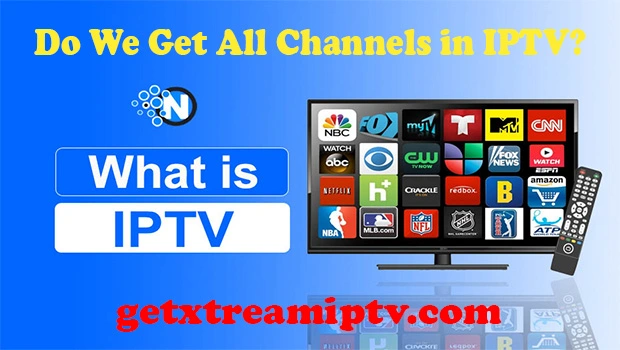Internet Protocol Television (IPTV) has revolutionized how we consume television content. Many people transitioning from traditional cable or satellite TV to IPTV often ask, “Do we get all channels in IPTV?” In this comprehensive guide, we aim to clarify the variety of channels offered by IPTV services, the factors influencing channel availability, and how to make the most out of your IPTV subscription.
Table of Contents
What Is IPTV and How Does It Work?
IPTV is a digital television broadcasting system that uses the internet to deliver video content. Unlike traditional television, which relies on satellite or cable signals, IPTV streams content directly to your device through your internet connection. This allows users to access live TV, on-demand shows, and even international channels from various devices.
With IPTV, the focus is on flexibility, variety, and affordability. However, understanding what “all channels” means is essential before committing to a service.
Do IPTV Services Provide Access to All Channels?
The short answer is no single IPTV service guarantees access to every channel globally, but most services offer an extensive range of channels that can include:
- Local and National TV Stations: Regional programming, including news, sports, and entertainment, is commonly available.
- International Channels: Many IPTV providers offer access to channels from other countries, catering to diverse audiences.
- Premium Networks: Popular channels like HBO, Showtime, and sports networks might be included, but they often depend on the service’s licensing agreements.
- Specialty Content: Niche channels focusing on specific genres, such as documentaries, anime, or fitness, are frequently part of the package.
The extent of channel availability depends on the IPTV provider, their partnerships, and whether the service operates legally or through less conventional means.
Key Factors Influencing Channel Availability on IPTV
1. Licensing Agreements
Legal IPTV providers operate under strict licensing rules, which can limit the channels they offer. Licensing ensures high-quality streams and legal compliance but may exclude certain premium or international channels.
2. Subscription Plans
IPTV services often provide tiered subscription packages. Higher-tier plans generally include more channels and premium content, while basic plans focus on local and free-to-air stations.
3. Internet Speed and Device Compatibility
Some channels, especially those broadcasting in HD or 4K, require faster internet connections. If your device or connection cannot handle high-definition streaming, channel access may be restricted to SD-quality options.
4. Geographical Restrictions
Certain channels are geo-blocked, meaning they are only accessible within specific regions. Using a Virtual Private Network (VPN) is a common workaround for accessing geographically restricted content.
What to Expect from a High-Quality IPTV Subscription
Extensive Channel Lineup
A good IPTV provider typically offers thousands of channels, including live TV, movies, and TV series. Look for providers with a strong reputation for variety and consistent performance.
On-Demand Libraries
In addition to live TV, many IPTV services provide vast on-demand libraries, giving you access to movies, series, and documentaries anytime.
Regular Updates
Reliable IPTV services frequently update their channel lists, adding new content and removing broken links. This ensures users have a seamless viewing experience.
Popular Features of IPTV Services
1. Electronic Program Guide (EPG)
The EPG feature allows users to navigate channel schedules effortlessly, ensuring they never miss their favorite shows.
2. Catch-Up TV
Many IPTV providers include a catch-up feature, enabling users to watch missed shows from the past few days.
3. Multi-Screen Streaming
Premium IPTV subscriptions often support streaming on multiple devices simultaneously, ideal for families or group households.
4. Compatibility with Multiple Devices
IPTV services are accessible via smart TVs, streaming boxes, smartphones, tablets, and even web browsers.
How to Choose the Right IPTV Provider
When selecting an IPTV service, consider the following:
- Channel List: Ensure the provider offers the channels you prioritize, such as local news, sports, or specific international networks.
- Service Reliability: Read reviews about the provider’s server stability and streaming quality.
- Customer Support: A good provider offers responsive support to resolve technical issues promptly.
- Trial Periods: Opt for services that offer a trial period to test channel availability and streaming quality before committing.
- Legal Compliance: Using a legally compliant IPTV service protects you from risks associated with unauthorized providers.
Can You Access Premium and Pay-Per-View Channels on IPTV?
While some IPTV services include premium channels like HBO or sports events, these are typically part of premium subscription plans. Access to pay-per-view (PPV) events often incurs additional fees, so it’s essential to confirm availability with your provider.
Enhancing Your IPTV Experience
1. Use a VPN
A VPN can unlock geographically restricted content, expand your channel options, and protect your privacy while streaming.
2. Upgrade Your Internet Connection
Ensure your internet speed meets the minimum requirements for high-quality IPTV streaming. For HD and 4K content, speeds of at least 25 Mbps are recommended.
3. Choose the Right Device
Devices like Fire Stick TV, Android TV boxes, or dedicated IPTV boxes often provide smoother streaming experiences compared to older smart TVs or mobile phones.
Conclusion
While no IPTV service can claim to offer every channel worldwide, the diversity and customization options provided by IPTV make it a superior choice for most viewers. By understanding the factors affecting channel availability and choosing the right provider, you can enjoy a viewing experience tailored to your preferences.
